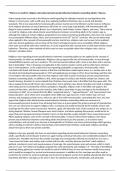“There is no need for religious rules about private sexual behaviour between consenting adults.” Discuss.
Many changes have occurred in the Western world regarding the attitudes towards sex and legislation that
follows in recent years, with a shift away from applying traditional Christian rules as moral and absolute
standards. This is true especially for homosexuality and pre-marital sex in the Western world, however influence
from religious doctrines on sexual behaviour still exists on a very large scale globally, with homosexuality still
illegal in many countries including Brunei, Iran, Mauritania, Saudi Arabia, Yemen, Nigeria, and more. There may be
no need for religious rules about private sexual behaviour between consenting adults in the modern age as,
although the origins of certain religious propositions have rational contextual justifications, they have not evolved
to accommodate different ideas, views, and circumstances in the 20 th and 21st centuries. We can see below that,
when applied to the concepts of homosexuality and pre-marital sex, religious rules can be seen to be outdated,
and more lenient guidelines such as those of the Church of England may be more acceptable. Whilst religious
rules work successfully with extra-marital sex, it can be argued that this concept does not fall under private sexual
behaviour. Therefore, other methods of ethics may be more acceptable rather than religious rules, such as
Fletcher’s situation ethics.
Religious rules regarding private sexual behaviour between consenting adults can be applied to the concept of
homosexuality, to which are problematic. Religious rules go against the idea of homosexuality, as seen through
isolated Biblical quotes, such as in Leviticus: “Do not have sexual relations with a man as one does with a woman,
that is detestable”. This is obviously not applicable in the modern western world, and has often been criticised
due to mistranslations, as the original text was regarding paedophilia as opposed to homosexuality, which
correlates with Greek and Roman customs at the time and therefore makes logical sense. In a society such as the
UK which decriminalised homosexuality in 1967 and legalised gay marriage in 2014, these teachings and their lack
of correlation with laws justifies the view that religious rules hold no place involving in private sexual behaviour
between consenting adults. In addition to this, other passages in Leviticus also forbids unkept hair, tattoos, and
beard trimming, therefore it can be implied that Christians cherry-pick rules in the Bible that they agree with. This
idea is supported by Gareth Moore who claimed that ‘cherry picking’ rules attack minorities and result in religious
rules being used to inconsistently reinforce prejudices. Arguably, religious rules in the Bible only apply to the
context of their time, and this was also raised by John Selby’s open letter on gay marriage to the Archbishop of
Canterbury in 2007, as he claimed that the Bible “supported slavery”, “opposed Darwin”, and “kept women from
being educated”, all of which were acceptable views 2000 years ago however, in the modern day, we have
answers and changing societal norms, which are also in line with homosexuality. Contrasting this view, one may
argue that religious rules about private sexual behaviour between consenting adults are necessary as
homosexuality prevents humans from achieving their telos as it goes against the primary precept of reproduction.
One can use natural law to support religious rules, as Aquinas was endorsed heavily by the Catholic Church and
teachings by him often centre around God. However, again, this idea falls short of the context it was written in, as
during Aquinas’ lifetime, human lifespans were much shorter, and when applying this precept, would be fair to
argue that post-menopausal women shouldn’t marry or that infertile couples shouldn’t have sexual intercourse?
When applying religious rules to the concept of homosexuality, it may be inferred that religious rules about
private sexual behaviour between consenting adults should not be put into practice, as it contains many
contradictions, and can lead to an increase in homophobia as Christians can cherry-pick teachings whilst ignoring
others, leading an ethicist to believe that perhaps only fundamental Christians could apply religious teachings
about this topic to their own private activities.
Religious rules may arguably also have no need when regarding private sexual behaviour between consenting
adults, specifically concerning pre-marital sex, again having contextual relevance, but considerably lacking it in the
modern day. The Bible references the sanctity marriage and consequently criticised pre-marital sex as it says a
“man leaves his father and mother and is united with his wife, and they become one flesh” which implies a
spiritual, emotional, social, and sexual purpose of marriage, the union between man and woman, which is God’s
plan as he says “be fruitful and multiply; populate the earth abundantly and multiply in it”. This idea of the Biblical
teachings being against pre-marital sex would be useful in biblical times as men and women would marry young
and it would be arranged, for survival and economic purposes. In addition to this, marriage was often used as
protection for women to avoid concubinage and to prevent pregnant women from getting abandoned after being
betrothed, therefore, marriage can be seen to have its usefulness practically, emotionally, and spiritually,






